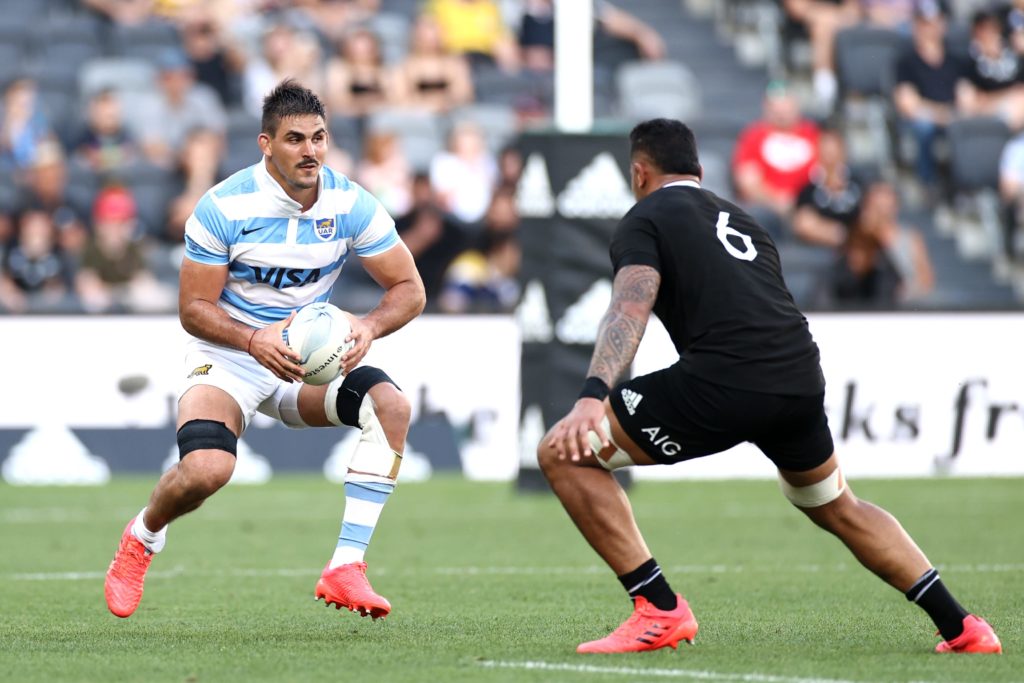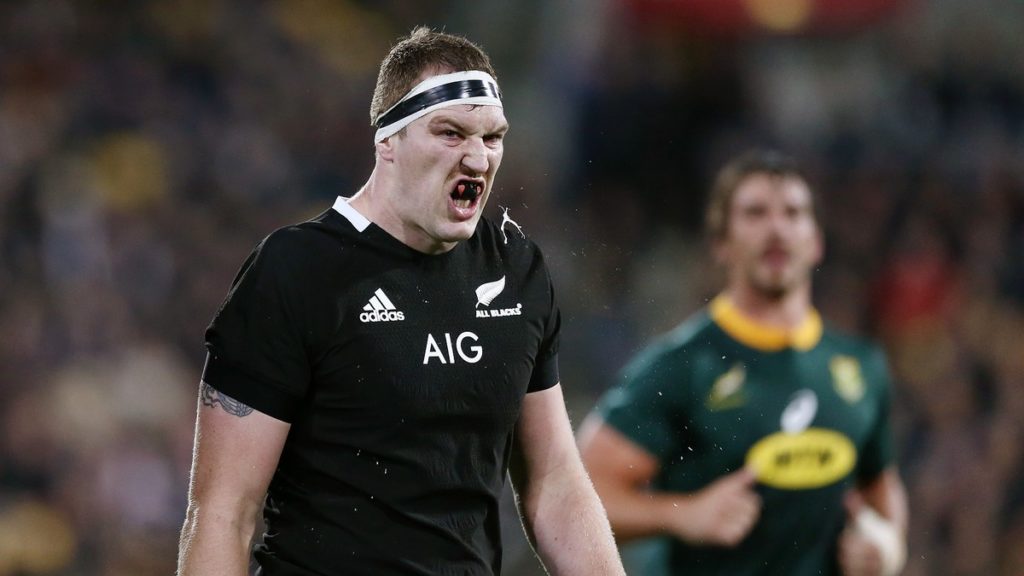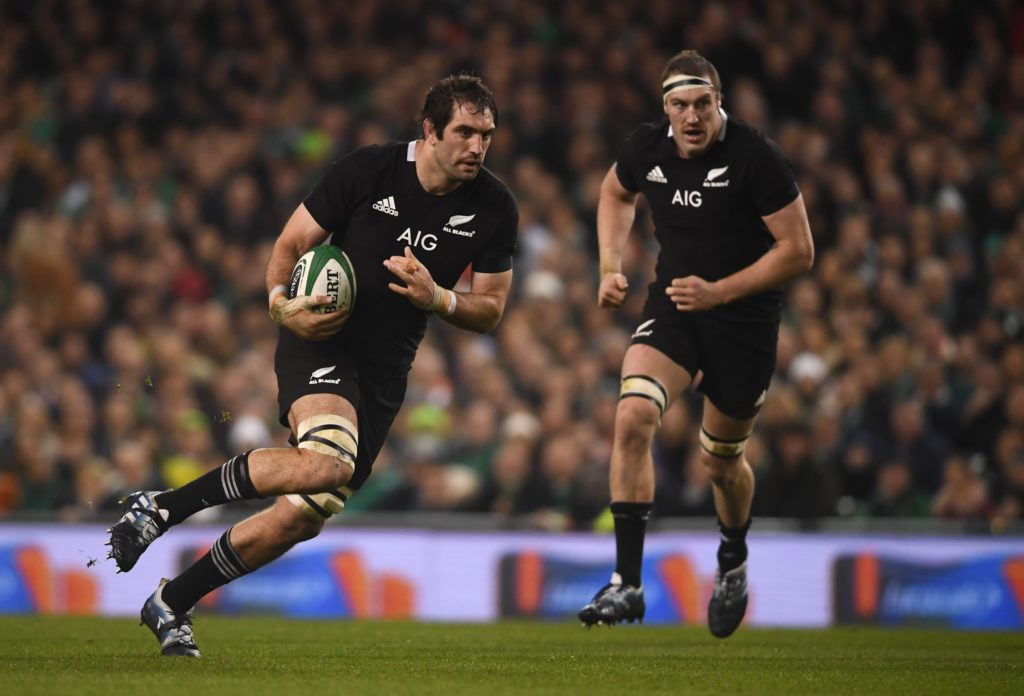If anything summed up Argentina’s first-ever victory over the All Blacks it would probably be the image of Pumas’ captain Pablo Matera after he had won a turnover near the end of a memorable and highly emotional test.
The All Blacks, desperate to make inroads after spending more than three quarters of the game running into a blue and white wall, had failed to nullify the threat Matera, big for an openside flanker at 1.93m and at least 110kg, posed at the breakdown and the skipper emerged with the ball and a penalty for his side.
He stood for a moment, his massive arms wrapped around the ball and eyes focused in the stand somewhere – perhaps searching for coach Mario Ledesma – a look on his face suggesting that if all else failed he was quite prepared to stop the All Blacks’ attempted comeback by strength of will alone.
It wasn’t necessary of course. The Pumas made history with a 25-15 victory at Bankwest Stadium in western Sydney because all of their players had a similar grim determination and effectiveness as Matera.

Remarkably, for a side who have previously struggled with composure and discipline, they were better in those areas than their opposition too. How they maintained their level of intensity for 80 minutes almost defied belief considering they haven’t played a test in 13 months.
That Argentina could beat the All Blacks so convincingly despite half a dozen of their players and coach Ledesma recovering from the coronavirus, spending weeks in quarantine without access to a training pitch and preparing for the Tri Nations in Australia with a couple of warm-up games, may have thrown the accepted wisdom of how to prepare for a test out of the window.
What it has definitely done is once again highlight the importance of the mental side of the game – the Argentines were playing for something bigger than themselves. Truly, they were playing for a nation that has suffered more than 35,000 deaths in the pandemic.
It was also a big reminder of the importance of size in a forward pack. That in itself is not enough because it must be harnessed properly. But the Pumas forwards, bigger than the man they were marking in nearly every case, were so connected, so determined, and so technically good from virtually the kick-off that the All Blacks couldn’t gain any forward momentum. It exacerbated a downward spiral that fed on itself via a narrow attacking game that played into the considerable hands and arms of the Argentine players.
He stood for a moment, his massive arms wrapped around the ball and eyes focused in the stand somewhere – perhaps searching for coach Mario Ledesma – a look on his face suggesting that if all else failed he was quite prepared to stop the All Blacks’ attempted comeback by strength of will alone.
Those New Zealand supporters feeling like watching their team’s pack getting dominated by a nation they have never lost to was akin to watching the world suddenly turn upside down clearly haven’t seen the warning signs because this wasn’t a purely recent occurrence.
This year the black pack was second best in Wellington during the Bledisloe Cup draw with Australia and in the defeat to the Wallabies in Brisbane. In hindsight the sirens should have been sounding then because Australia have traditionally struggled against the All Blacks in this area.
In between times Ian Foster’s men were better at Eden Park for the first win of the new era and much better in Sydney for the 43-5 demolition over the Wallabies but this wild inconsistency had its beginnings in 2017 when the British and Irish Lions highlighted the importance of a big, motivated and well-drilled pack and continued a year later when the Springboks pushed the All Blacks around in Wellington during their victory.
Last year at the World Cup the All Blacks had no answer to England’s muscularity in the semi-final.
This may be a difficult concept for All Blacks’ supporters to get their heads around, but a team built on the pioneering spirit of the nation’s forefathers – a theme (or myth) of new frontiers being conquered by big and rugged explorers and farmers, something tapped into by former head coach Steve Hansen at last year’s World Cup – are not as big and rugged as they may like to think they are.

It’s not as if they have suddenly become soft but there seems to be a spark missing from this team; an occasional malaise which can be traced to somewhere in the pack and which is highly contagious.
What is without doubt is that they are missing the imposing form of Brodie Retallick and not only for the physical edge he brings to the All Blacks at the set piece and breakdown or when he carries the ball – all sharp knees and elbows like a runaway isosceles triangle.
Retallick, absent all year due to a sabbatical in Japan, also brings a relentlessness the All Blacks have been missing badly. With Tupou Vaa’i just starting his test career, Patrick Tuipulotu struggling to reproduce his Super Rugby form at the highest level, and Scott Barrett prone to giving away unnecessary penalties and struggling for consistency, Sam Whitelock has the appearance of a man in dire need of help.
What is without doubt is that they are missing the imposing form of Brodie Retallick and not only for the physical edge he brings to the All Blacks at the set piece and breakdown or when he carries the ball – all sharp knees and elbows like a runaway isosceles triangle.
The beginnings of a black eye against the Pumas may have coloured the picture as it were but Whitelock looked tired at Bankwest Stadium as he often has on the pitch this year.
A day afterwards he denied his energy levels were flagging but did admit the work of the All Black tight five had been plagued by inconsistency.
“A little bit like the results over the last few weeks, we’ve had a couple of really good performances and some that we know we can be better in,” Whitelock said. “It’s about taking the lessons and smoothing out that curve so it’s not so up and down. It’s on myself as a senior player and obviously Dane [Coles] is another one – we have to drive that big time around our set piece and breakdown to allow our team to play.”
Sam Cane is the other senior player in the mix, and he is performing perfectly well in terms of his loose forward play. But the All Blacks are lacking the diesel-powered grunt the man known as Guzzler brings and the beauty of Retallick’s game is that it doesn’t rely on brutality.
That’s a trump card he’ll always have but it’s the subtlety of his passing plus his innate game awareness that takes him from being a very good player to a great one. Simply put, the All Blacks are nowhere as good without him on the field and that’s becoming increasingly evident.
It’s perhaps fortunate for Foster and company that they are not visiting the Northern Hemisphere this year because England, Ireland and Scotland would all pose significant problems up front; what is considered a current minor crisis in New Zealand could conceivably be a full-blown sporting catastrophe.
There is also an irony at play because while not always the biggest pack, the All Blacks tight forwards could be relied upon to bring a running and handling game that was generally on a different level to the opposition. The trouble is, with men such as Taniela Tupou at the Wallabies and England’s Mako Vunipola reaching new heights with the ball, the All Blacks are being left behind here too.

A couple of years ago, Sir Michael Jones, the great All Blacks loose forward, described Retallick as a “very, very special player” and one that is approaching the status of another great – the late Sir Colin Meads.
“We’ve been very privileged and blessed as New Zealand Rugby and as All Blacks to have great locks throughout the ages,” Jones said.
“Sir Colin Meads was the pinnacle, and there’s a lot about Brodie that speaks about a modern-day Sir Colin. The ruggedness, the toughness, the mental resilience and the way he’s come back from injury.
“He’s a true professional.”
Seven years ago, when the Whitelock-Retallick partnership was approaching greatness and the pair were about to face each other for the Crusaders and Chiefs respectively in a Super Rugby semi-final, I rang Sir Colin in order to get his opinion on a couple of locks who appeared destined for big things.
“Whitelock’s the all-round player, he’s got everything,” Meads told me of one half of an All Black locking combination which will be considered as one of the best ever. “He’s their go-to man from kick-offs, he’s pretty keen to take the ball which is always a great sign.
“Brodie’s a big rough guy who gets stuck into everything. They’re different but both very good.
“They’re both pretty fit young guys and they have a tremendous workrate. They can keep it up for 80 minutes if they have to.”
They and the All Blacks are also better when they’re together but in Retallick’s continued absence, Foster’s men will have to find another way. A study of Matera’s total commitment against them at the weekend may give them a few clues.


Comments
Join free and tell us what you really think!
Sign up for free